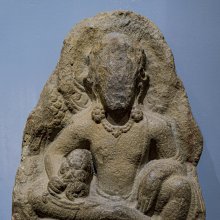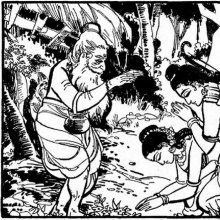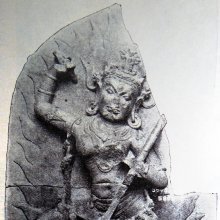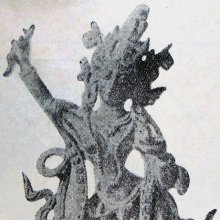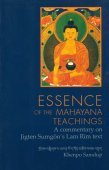Happiness: 3 definitions
Introduction:
Happiness means something in Hinduism, Sanskrit, Jainism, Prakrit. If you want to know the exact meaning, history, etymology or English translation of this term then check out the descriptions on this page. Add your comment or reference to a book if you want to contribute to this summary article.
Images (photo gallery)
(+2 more images available)
In Hinduism
Natyashastra (theatrics and dramaturgy)
Source: Shodhganga: Elements of Art and Architecture in the Trtiyakhanda of the Visnudharmottarapurana (natya)Happiness (expression) is associated with Prasārita: one of the “five kinds of side-movements” (in Sanskrit Dramas), as conveyed through Āṅgikābhinaya: one of the four divisions of Abhinaya or “ways to convey or represent one’s emotion to others”, according to the Nāṭyaśāstra and the Viṣṇudharmottarapurāṇa, an ancient Sanskrit text which (being encyclopedic in nature) deals with a variety of cultural topics such as arts, architecture, music, grammar and astronomy.—The āṅgikābhinaya includes the histrionic representation of the limbs which is simply known as physical gestures. There are five kinds of side movements accepted in the Viṣṇudharmottarapurāṇa. The prasārita movement shows triumph, happiness and joy. The term prasārita means expanded.

Natyashastra (नाट्यशास्त्र, nāṭyaśāstra) refers to both the ancient Indian tradition (shastra) of performing arts, (natya—theatrics, drama, dance, music), as well as the name of a Sanskrit work dealing with these subjects. It also teaches the rules for composing Dramatic plays (nataka), construction and performance of Theater, and Poetic works (kavya).
Yoga (school of philosophy)
Source: ORA: Amanaska (king of all yogas): A Critical Edition and Annotated Translation by Jason BirchHappiness is denoted by the Sanskrit term Akalmaṣa, according to the Bhagavadgītā verse 6.25cd-27.—Accordingly: “Having fixed the mind on the self, [the Yogin] should think of nothing whatsoever. Wherever the fickle and unsteady mind moves, there, having restrained it, he should direct it [back] to the self. For, supreme [transcendental] happiness (sukha) approaches that untainted Yogin whose mind is tranquil and his restiveness quelled, [because he has] attained the absolute”.

Yoga is originally considered a branch of Hindu philosophy (astika), but both ancient and modern Yoga combine the physical, mental and spiritual. Yoga teaches various physical techniques also known as āsanas (postures), used for various purposes (eg., meditation, contemplation, relaxation).
In Jainism
General definition (in Jainism)
Source: The University of Sydney: A study of the Twelve ReflectionsHappiness cannot be found in Saṃsāra, as discussed in Bhūdhardās’s composition dealing with the twelve reflections (bhāvanā or anuprekṣā), also found in the Tattvārtha-sūtra.—Accordingly, “[all things are impermanent]—King, prince or emperor, an elephant’s mahout: everyone dies someday each at his own time. (1) [there is no shelter] Powerful friends, a goddess or a god, mother, father, family: they can do nothing to stop the soul going at the moment of death. (2) [cycle of rebirth] So poor you cannot meet the cost, you suffer. You are entranced by the desire for wealth. Nowhere in saṃsāra will you find happiness no matter where you look in the world. (3) [...]”.

Jainism is an Indian religion of Dharma whose doctrine revolves around harmlessness (ahimsa) towards every living being. The two major branches (Digambara and Svetambara) of Jainism stimulate self-control (or, shramana, ‘self-reliance’) and spiritual development through a path of peace for the soul to progess to the ultimate goal.
See also (Relevant definitions)
Ends with: Feeling Happiness.
Full-text (+2157): Sukha, Saukhya, Ananda, Mudita, Anandi, Nirvriti, Kushala, Nandathu, Syona, Kshema, Cittaprasannata, Sukhada, Susthata, Sukhavaha, Sugati, Sharman, Sammada, Dishti, Bhagya, Shivatati.
Relevant text
Search found 456 books and stories containing Happiness; (plurals include: Happinesses). You can also click to the full overview containing English textual excerpts. Below are direct links for the most relevant articles:
Some Songs I have Sung to Gandhiji < [September 1944]
Tagore's Concept of Death < [October 1958]
Reviews < [March 1940]
Dhammapada (Illustrated) (by Ven. Weagoda Sarada Maha Thero)
Verse 28 - The Story of Monk Mahākassapa < [Chapter 2 - Appamāda Vagga (Heedfulness)]
Verse 131-132 - The Story of Many Youths < [Chapter 10 - Daṇḍa Vagga (Punishment)]
Verse 2 - The Story of Maṭṭakuṇḍali < [Chapter 1 - Yamaka Vagga (Twin Verses)]
The Devi Bhagavata Purana (by Swami Vijñanananda)
Chapter 18 - On the narrative of Rāhu Maṇḍalam < [Book 8]
Chapter 34 - On the methods of the worship of the Devī < [Book 5]
Chapter 23 - On the description of the remaining hells < [Book 8]
Maha Prajnaparamita Sastra (by Gelongma Karma Migme Chödrön)
Part 1.3 - The reward of the upāsaka < [Section II.1 - Morality of the lay person or avadātavasana]
III. Exhortations to the practice of the six perfections (pāramitā) < [Part 3 - Establishing beings in the six perfections]
II. Degrees of Loving-kindness and Compassion < [Chapter XLII - The Great Loving-kindness and the Great Compassion of the Buddhas]
Garga Samhita (English) (by Danavir Goswami)
Verses 2.24.17-18 < [Chapter 24 - The Story of Asuri Muni in the Rāsa-dance Pastime]
Verse 5.9.41 < [Chapter 9 - The Happiness of the Yadus]
Verse 5.3.9 < [Chapter 3 - Akrūra’s Arrival]
Related products
(+3 more products available)
